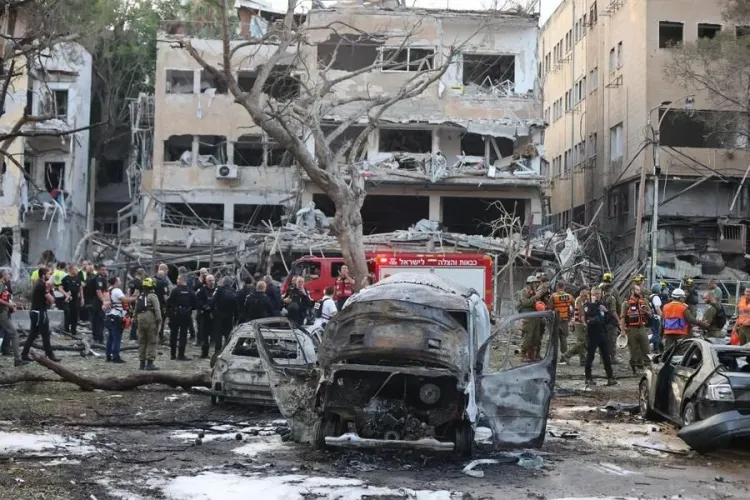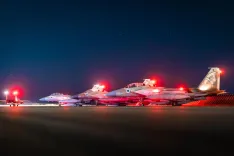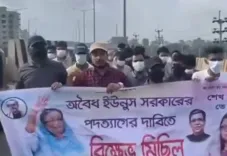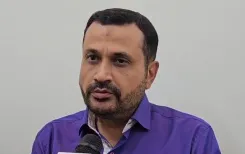What happened as Iran missile strikes kill eight in Israel?

Synopsis
Key Takeaways
- Iran's missile attacks have resulted in significant casualties in Israel.
- Israeli airstrikes targeted Iranian military facilities in Tehran.
- Over 87 people were treated for injuries following the missile strikes.
- The conflict has entered a critical fourth day, raising alarm about regional stability.
- Both nations are engaged in a cycle of retaliatory strikes.
Jerusalem, June 16 (NationPress) - In a dramatic escalation of the ongoing conflict, Iran executed a pre-dawn missile assault on Israel on Monday, resulting in the deaths of at least eight individuals and numerous injuries, according to reports from Israeli officials. This incident marks the fourth day of intense hostilities ignited by an unanticipated Israeli offensive.
The missile strikes triggered air raid sirens throughout Israel, with substantial smoke billowing over Haifa, a significant coastal area in northern Israel. Witnesses recounted hearing multiple detonations in both the northern and central parts of the nation.
Authorities have confirmed casualties in diverse locations. Four individuals lost their lives when a missile hit a residential structure in Petah Tikva, situated east of Tel Aviv, as stated by Mayor Rami Greenberg. He noted that hundreds of residents from the affected building and three nearby structures were evacuated. Images from the site revealed multi-story buildings extensively damaged by the blast, littered with debris.
Additionally, three fatalities were reported in Haifa, while an 86-year-old man perished in Bnei Brak due to the collapse of his apartment caused by the shockwave from a nearby strike. A total of 87 individuals were treated in hospitals, including one woman in critical condition and five others in moderate condition, with the rest suffering from minor injuries.
One missile also landed near the United States consulate and embassy branch in Tel Aviv. US Ambassador Mike Huckabee mentioned on the social media platform X that the blast caused slight damage, but no US personnel were harmed.
The Iranian missile strikes followed Israeli airstrikes targeting surface-to-surface missile installations in Tehran and central Iran. Israel's Defense Minister Israel Katz warned that residents of Tehran would “pay the price — and soon” for the missile assaults on Israeli urban areas.
The Israeli Defense Ministry also indicated that several Iranian drones were deployed during the recent missile onslaught. Eight of these drones were intercepted by Israeli naval missile boats, marking the first operational deployment of the Barak Magen air defense system, which is designed to counter drones, cruise missiles, rockets, and anti-ship missiles.
The latest Iranian missile strikes come amid ongoing strikes from both Israeli and Iranian forces, as the conflict enters its fourth day. Since hostilities erupted, a total of 22 individuals have been reported killed in Israel, according to a tally by Israel's state-run Kan TV.
In response, the Israeli military announced on Monday that it had executed an airstrike on the Quds Force command center in Tehran, resulting in the deaths of four high-ranking Iranian military officials. Those killed include Mohammad Kazemi, the head of the Islamic Revolution Guard Corps' (IRGC) Intelligence Organization, and his deputy Mohammad Hassan Mohaqiq. Other casualties included Mohsen Bagheri, head of the Quds Force Intelligence Department, and his deputy Abu al-Fadl Nikouei.
The Israeli military asserted that the strike, carried out on Sunday, targeted a facility utilized by the Quds Force, which is the IRGC's elite unit responsible for overseas operations, including intelligence collection, military assistance, and paramilitary actions.
Iran's semi-official Tasnim news agency acknowledged the deaths of Kazemi, Mohaqiq, and Bagheri, attributing the Sunday strike in Tehran to Israel.
This operation against the Quds Force command center is the latest in a series of Israeli strikes initiated on Friday, which are aimed at dismantling Iran's nuclear and military capabilities.
In its most substantial air assault on Iran to date, Israel struck nuclear sites in Tehran and other locations on Friday, causing damage to military installations and residential areas, resulting in at least 244 fatalities and 1,277 injuries, with over 90% of the casualties being civilians, according to the Iranian Health Ministry, as reported by Xinhua news agency.
The Iranian Health Ministry also confirmed that residential neighborhoods were affected. Israel Defense Forces (IDF) spokesperson Daniel Hagari stated that fighter jets successfully destroyed approximately one-third of Iran's surface-to-surface missile launchers during a comprehensive overnight operation. More than 50 aircraft participated in these strikes, targeting over 120 missile launchers across various locations in central Iran.









